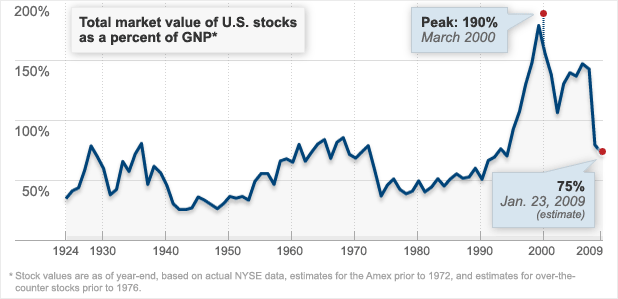Berkshire Hathaway and Fairfax Financial are perhaps the two of the greatest asset allocating machines out there today. They both released their 13-F filing yesterday, listing their common stock holdings at the end of the December period. Paying particular attention to Fairfax, we see a lot of major positions:
(Value, in $)
102 mil Alcoa99 mil Burlington Northern271 mil Dell
162 mil Frontier Communications
195 mil GE234 mil Intel459 mil Johnson and Johnson
98 mil King Pharma
294 mil Kraft Foods96 mil Level 3 Comm.
159 mil Magna Intl318 mil Pfizer
104 mil Wells Fargo*Note: Positions in bold are new.
Not surprisingly, there is a lot of overlap with Buffett, who holds major positions himself in Burlington Northern, Kraft, Wells Fargo, and Johnson and Johnson.
According to Nasdaq, the total value of
U.S.-listed common stock holdings at Fairfax is now up to *$4.7 billion (this excludes any foriegn holdings). Just over two years ago, the
total common stock portfolio was at about $1.8 billion, and that was significantly hedged with market short positions. Prem and co. are at last putting major money into work with stocks, indicating that they see significant returns ahead. If they're right, great things lie in store for shareholders of Fairfax.
Source:
http://holdings.nasdaq.com/asp/OwnerPortfolio.asp?FormType=OwnerPortfolio&CIK=0000915191&HolderName=FAIRFAX+FINANCIAL+HOLDINGS+LTD%2F+CAN*Correction, 2/19/09: included in the Nasdaq portfolio was $2.2 billion in value of Odyssey Re shares which were not included under equities in their 2006 balance sheet. Because Fairfax reported earnings today however, we know that total common stocks is at $3.8 billion, with $2.3 billion added to investments in the quarter. So although not as large as the originally stated notional amount, there has been a considerable increase in their common stock exposure.
Disclosure: The author owns shares in Fairfax Financial, Odyysey Reinsurance, and Burlington Northern.

